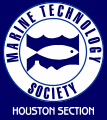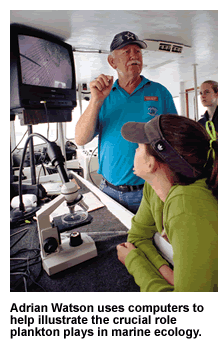
FLOATING CLASSROOM
|
****JavaScript
based drop down DHTML menu generated by NavStudio. (OpenCube Inc.
- http://www.opencube.com)****
|
|
Web
Master |
|
|
|
All
Aboard!
Kids of all ages set sail for adventure
on floating classroom
by Lorri Jones
The chains rattle and clank over the pulley as they drag the sloshing nets out of the water. The shells of all kinds of crustaceans and other sea creatures crack against the deck as wide eyes stare in amazement at the treasure just pulled from the waters of Texas' stretch of the Gulf Intra-coastal Waterway.
Adrian
Watson, a program assistant aboard the RV Karma, teaches members of Girl
Scout Troop 814 of Sugar Land important facts about Intracoastal Waterway
marine life
The continuous string of exclamations from onlookers is as colorful as
the catch:
"Oh, cool! It's a tire!"
"Eeww! That's not cool!"
"Oh, it's a crab and fishies!"
"Yeah, lots of fishies!"
"Look, it's a flounder!"
"Oh, wow! That's a really big crab!"
"Look, one of the fish jumped out of the net onto the deck!"
These are hardly the sounds that one associates with a classroom. But then, this is no ordinary classroom.
 The
Marine Advisory Service's Floating Classroom Program targets young Texans,
helping them discover the delicate balance between shore and sea. This
joint program of Texas Cooperative Extension and the Texas Sea Grant College
Program is a hands-on learning experience that combines the sciences of
biology and ecology with reading, social studies, writing and mathematics.
The
Marine Advisory Service's Floating Classroom Program targets young Texans,
helping them discover the delicate balance between shore and sea. This
joint program of Texas Cooperative Extension and the Texas Sea Grant College
Program is a hands-on learning experience that combines the sciences of
biology and ecology with reading, social studies, writing and mathematics.
More than 3,000 students--school kids of all ages as well as adults from around the state--have climbed aboard the refurbished shrimping vessel, Karma, to discover the underwater universe of the Texas coast.
Observation tanks, microscopes, plankton nets and otter trawls replace desks and chalkboards in this classroom. The teachers are Extension marine education specialist Willie Younger, other Extension faculty and volunteer naturalists.
The full-day program incorporates two learning environments. One experience is a cruise aboard the teaching vessel into rich coastal waters, where the magic and mystique of the marine world are revealed through guided scientific inquiry.
The voyage is coupled with numerous complementary shoreside activities, which may include side trips to a nearby coastal marsh and the Gulf beach or critical-thinking exercises designed to generate a deeper understanding and appreciation for what the students have observed.
One Saturday this spring, 56 Cadettes from the South Texas Council of Girl Scouts, headquartered in Lake Jackson, and their parents boarded the Karma for the coastal adventure. The leaders agreed that the day's activities met their criteria for a fun, reasonably priced outing that also exposed the Cadettes to new career opportunities.
The council's newsletter described options for various field trips, explained Kathy Hambleton, Troop 814 leader in Sugar Land.
"Since the girls are older, they help make the decision on which ones they want to do. This was their first choice," she said.
About one-third of the Karma's passengers are repeat customers. On this voyage, Betty Page, a parent of one of the Cadettes and also a teacher at Our Lady Queen of Peace School in Lake Jackson, was impressed with the cruise and said she was ready to come back with her students.
"We have a great science program, and this would fit right in," she said.
The vessel-centered program first set sail in September 2001. It can accommodate 54 individuals per day.
 There
is a $1,000 fee for each cruise adventure. However, scholarships have
been provided through a grant from the U.S. Department of Commerce's Coastal
Impact Assistance Program, which is administered on the state level by
the Texas General Land Office, and by additional support from the Marine
Technology Society's Houston Chapter. Scholarships are awarded to offset
between 15 percent and 90 percent of the fee and are based on demonstrated
need, such as economic disadvantage or other circumstances.
There
is a $1,000 fee for each cruise adventure. However, scholarships have
been provided through a grant from the U.S. Department of Commerce's Coastal
Impact Assistance Program, which is administered on the state level by
the Texas General Land Office, and by additional support from the Marine
Technology Society's Houston Chapter. Scholarships are awarded to offset
between 15 percent and 90 percent of the fee and are based on demonstrated
need, such as economic disadvantage or other circumstances.
A Land Office-managed grant under the Coastal Management Program helped pay for the ship and the costs involved in transforming it from a working shrimp boat to a classroom. The Port of Bay City Authority provides a comfortable home port for the Floating Classroom Program. At the authority's Matagorda Harbor, the Karma has a front-row berth, and buildings are available for many of the shoreside activities.
Younger explained that the program targets young people because they are developing lifestyle habits now that will affect the future of the Gulf Coast.
"Everyone lives downstream from somewhere," Younger said. "Whether they live in Lubbock, Amarillo, El Paso or any other place, what they do in their home communities affects us down here on the coast. And what we do on the coast affects their lives as well."
 Adrian
Watson uses computers to help illustrate the crucial role plankton plays
in marine ecology.
Adrian
Watson uses computers to help illustrate the crucial role plankton plays
in marine ecology.
The 6,200 miles of shoreline along the Texas Gulf provides a sun-splashed
vacation setting for
countless Texans and out-of-state visitors. However, the Texas Coast is
also the home of an incredible range of wildlife and a $700 million fishing
industry.
Coastal communities depend on freshwater inflow to maintain the biological vitality of the bays and estuaries and to supply the sparkling sands that keep beaches from eroding. Significant actions upstream, such as run-off pollution, drought or water withdrawals, greatly affect the quality of the beaches, water and wildlife.
"Kids are naturally attracted to water," Younger said. "If we can get kids interested in science, technology and the environment by what we do during the cruise, we've had a good day. If it results in enhanced school performance or increased environmental stewardship, we've succeeded in our overall mission."
For information on tour scheduling or scholarships, visit the Floating Classroom's Web site at http://floatingclassroom.tamu.edu or call Younger at (979) 863-2940.